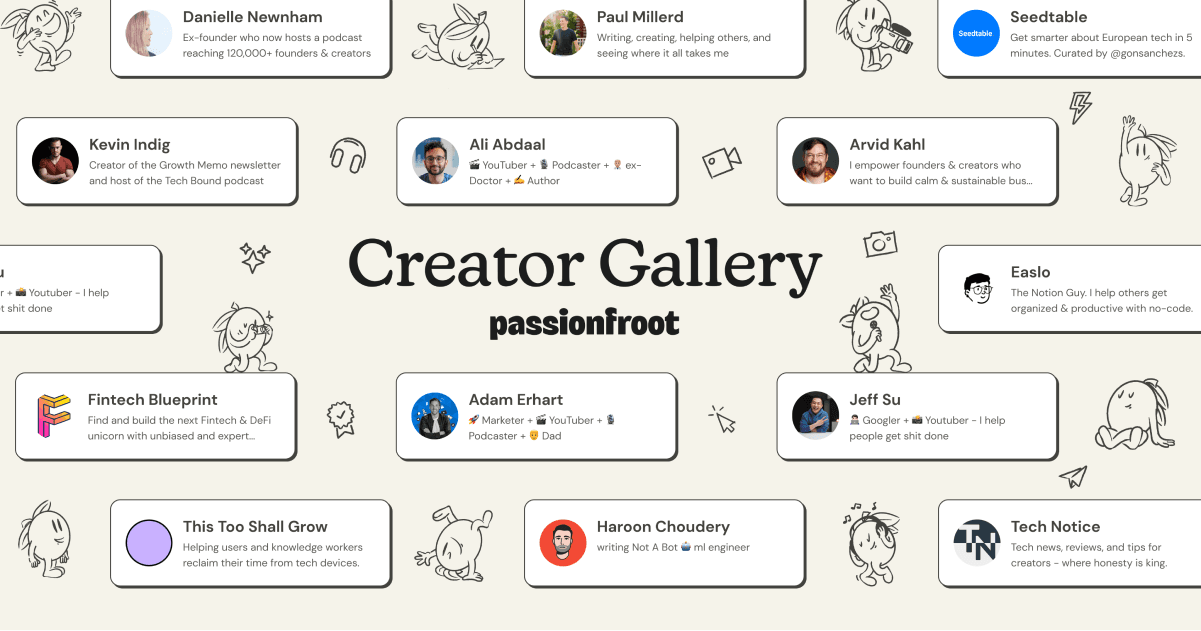Starting fresh — be it with a new social account, a new business, or anything — takes a lot of guts and requires a lot of passion.
It also helps to have a little something unique.
What that something is can be entirely up to you! We’ve found this to be the case for starting a new blog, building a new social media presence, or charting a new business path. And I’m excited to share what this looks like for one team in particular.
Cat Killfoil jumped feet first into a new opportunity and quickly blossomed, growing her digital agency with its own creative team and an average of 2,000 pieces of content going live each month for her clients.
What’s been the key to her success? And how might you learn from her story and follow in her footsteps? She was grateful to share with us what’s made the biggest difference: a fresh perspective on social media, some awesome strategies, and a great social media agency tool.
Here’s an inside look at the blueprint that’s helped Cat and TBD Media gain great results.
Our results have shown that our new agency has had great success in a very busy, emerging marketplace. There are so many options out there and it’s crucial to use every advantage we have, Buffer being one of them!
– Cat Killfoil, TBD Media
A fresh perspective: Being content-first with social media marketing
What’s your primary focus with your social media campaigns?
All great campaigns start somewhere, with an emphasis on something: reports, audience, network, budget. Cat Killfoil and the TBD Media team focus on content first, above all else.
When zooming out to look at the agency impact from a big picture, it can be useful to think on which services an agency performs. Yes, there’s a ton of great value in making a strategy for a client. There’s ton of value in reporting the numbers.
Equally valuable is the execution of the strategy and the creation (and publishing) of the content that leads to results.
It’s this content element that can sometimes take second stage. Cat has made it a key element of every client proposal, and she’s chosen Buffer as her tool of choice for making the content focus as smooth as can be.
TBD Media averages 2,000 unique pieces of content each month, many of which spread to 2x their client’s standard reach.
As an agency, I have clients that are much more demanding of me, and we’re thinking of more of a content strategy role than just a check-the-box fullfillment and “check-the-box and here’s the report.”
When you get into the bigger, really expensive tools that have been familiar with that crowd, any other platforms that I’ve used, they were were reporting-first and then tried to add on scheduling and team members.
Buffer was scheduling-first and then added on reporting. I think that worked in your favor in a lot of senses because you can see what people want to know, where as others were like, “Here’s your data, that should be good enough for your client.”
I think people can overthink it by asking, “Well, how do we prove social media?” Well, okay, let’s dial it way back and keep it really high-level: Are you just going to not do it and why would you bother just doing it half way?
For us, we choose to think: Let’s just do something creative, let’s do something fun, keep it simple, make it so that the client can understand it, and really set a goal and stick to it.
So any promotion, campaign, or strategy that we run we ask, “What is the goal here?” Is it to sign up for a three-day webinar, buy a shirt, opt in to an email?
We just want to know if what we put out there increased visibility and helped our clients reach potential customers.
On collaboration: How TBD Media involves each of its clients in the strategy
From the start, Cat and her team are eager to include their clients in the social media strategy as much as the client may want. Every setup includes a chance for the clients to have access to everything and be fully involved in the posting and reporting on their social accounts.
Each client is unique, of course. Some choose to take TBD Media up on their offer; others would prefer to stay hands-off.
Even among those who do use the access there is variety: Some clients love to peek and observe, others love to be involved in the content creation itself.
When I decided to go with Buffer, it was because I knew I was going to be adding team members, that I wanted to have quality control, and especially with the initial on-boarding phase: It’s nice to be able to add clients for approvals and show them why we make the decisions that we do.
Our team rocks. Our exceptional writers still have an approval process at TBD. Then for each client, if they so choose, I’ll add the client as a team member and give them access to their account so that they know what’s going out and when.
It’s a really great help if the client has someone in-house because, more and more, we collaborate with in-house marketing teams.
If they have something that’s happening in real-time, they can either make an adjustment or make sure it’s not going to double post on that same topic.
To set this up in Buffer, TBD Media goes into the individual settings for each profile and adds the client as Managers to the account.
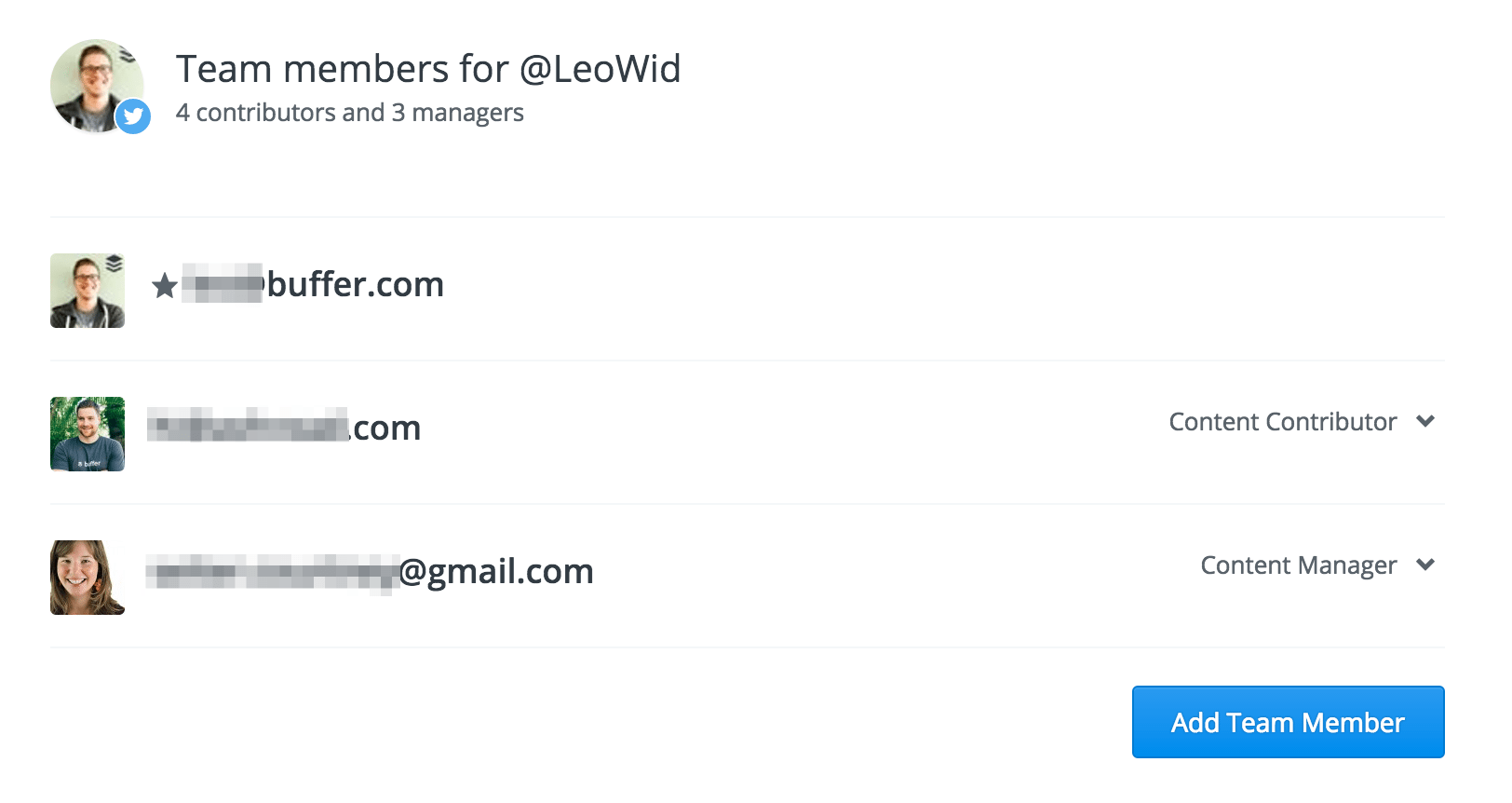
This way, the client will only see their own profiles (and none of the others that TBD manages), and they’ll have the ability to see everything that is scheduled to go out next as well as how everything is performing.
There’s an approve-appeal process that’s really streamlined in Buffer as opposed to how it was with some of my old agencies where we were spreading things out weeks in advance. I’ve got friends that work for big agencies, you know, even Nike or something, where they want to see all the content and spend a lot of time creating it, and then you have to go schedule it. There’s a lot of time we have to put into those steps with content calendering.
I don’t think we need to be spending that much time on the front end.
When you take some of that energy out of it, then you have more time to focus on making good content and making sure that everybody is on the same page with when it’s going out and what the point of it is. Then on the back-end just being able to grab it and say, “How did this do and perform?” Those analytics are getting more and more robust, and that’s been a great help to us as well.
“How can we show them why what we’re doing matters?”
Cat has the chance to get some really incisive feedback from her clients. Feedback like this:
“You’re just throwing a lot of numbers at me!”
What great feedback to learn from! This type of sentiment is one that a lot of clients might share, and it stems from data overload.
Updates sent.
Clicks per post.
CPC, CPM, engagement per impression, sentiment analysis. Phew!
There’s a lot to track, and there’s a lot to share with clients. What it comes back to for the TBD Media team is this central question: “How can we show them why what we’re doing matters?”
We want to make the data really digestible for the client. we want to say in human terms, “What is reach, why does it matter? What is impressions, why does that matter? What is the potential on social?”
We break it down really simply: the more fans we have, the more people there are to see it; the more interesting it is, the more chances we have to sell. Here’s your funnel and what we’re trying to do.
We want to make it a lot simpler conversation whereas with other tools, I feel, it’s more challenging to explain to a client.
One of my clients is a family member of mine, and he’s very blunt. He’ll tell me, “Well you’re just throwing a lot of numbers at me that haven’t sold me any of my products.”
That kind of opened my eyes to the fact that the reality that people are facing is they don’t understand social media skills. They’re still in the educational phase, so how can we show them why what we’re doing matters?
Again, it’s real simple, like this is how many people saw it and this is the reach; that’s all they want to see. So, when they can get in there themselves and I show it to them, it’s been a really easy thing as opposed to too much data or too overwhelming to someone who isn’t familiar with it and doesn’t use it daily like we do.
Cat and her team let clients view these stats right from within Buffer, and they’ve built a custom, in-house solution to report just these essential stats to their clients. In keeping with the theme of powerful simplicity, the reporting features in Buffer aim for clarity and results more than quantity and volume.
Every new Buffer for Business trialist can download PDF reports for the top 10 posts sent weekly, monthly, or any custom period, as well as a report on the overall trends in posts, followers, and engagement for any period. (All of it is white-label, too!)
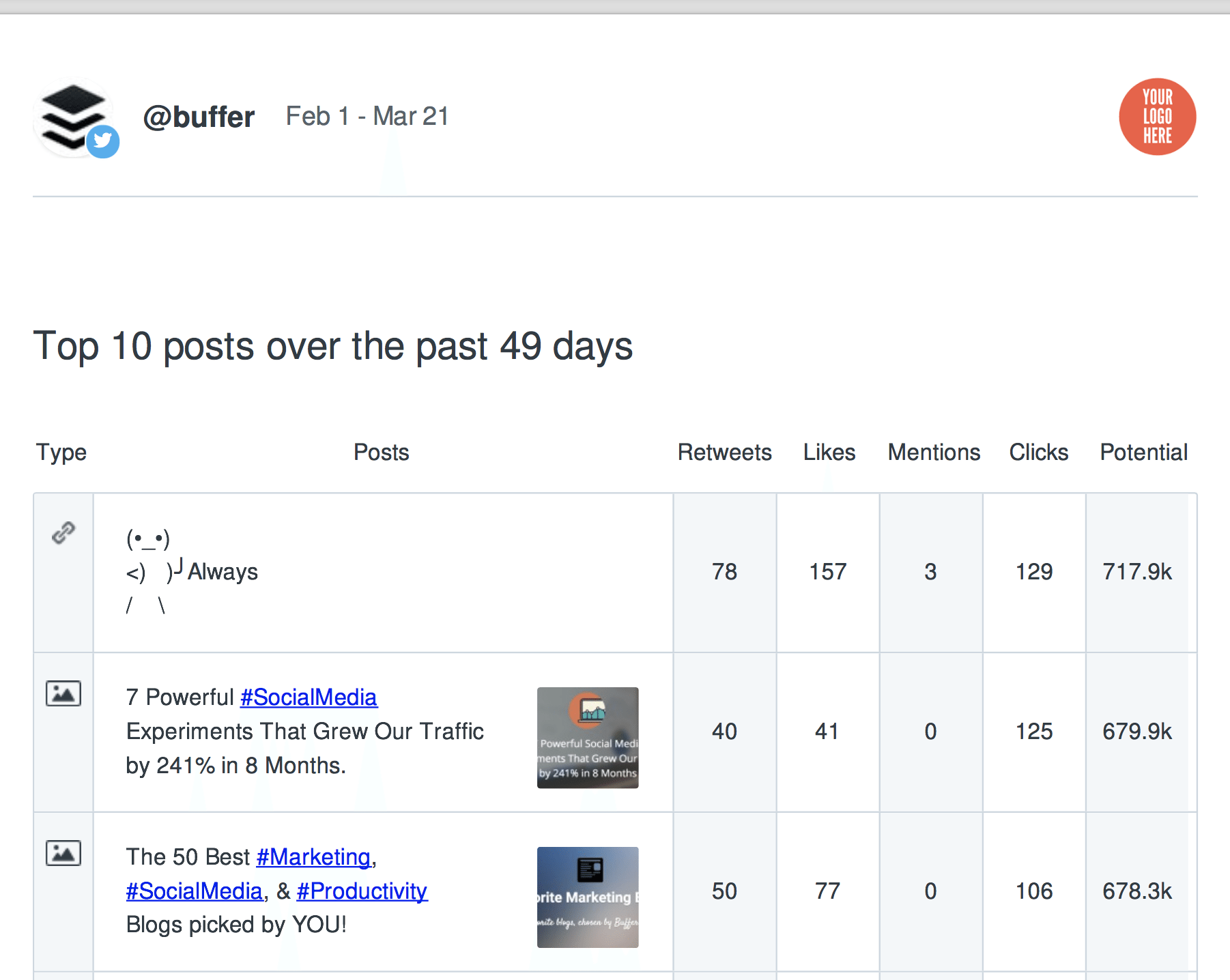
(Click here for a sample report)
Tip: Reshare & recycle your best content
One of our favorite strategies for social media marketing at Buffer is resharing our content more than once. There are multiple ways to spin a new blog post, and there is great value in resurfacing evergreen content.
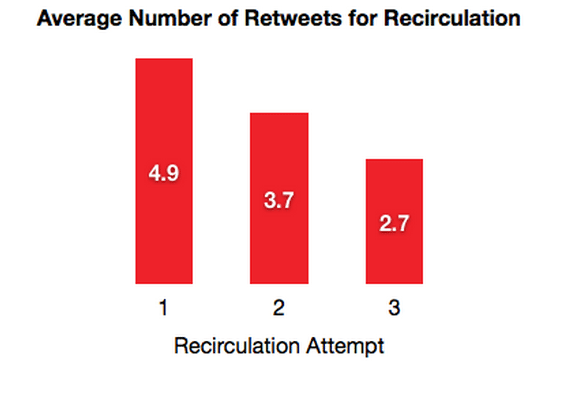
Cat has found the same to be true for her clients and has used this recycled content strategy to extend the life of content and drive consistent results.
It’s changed the way that I thought about marketing at my entire agency, because I used to have all these high, lofty “You can never re-share something more than once.” That kind of went away from me when I realized: “How about we just stick to what works and keep it going and keep that enthusiasm up” and, you know, find out what our client likes and actually just go with what our customers are responding with as opposed to what we think that you care about.
It’s made our content strategy a lot easier with the library features and being able to jump right in there and re-share that content.
And so far, so good. Especially things where they’re creating their own content. I have one client that works for an outsource/CMO vendor, and they heavily invest in content for blog-writing and for graphics and charts. They put out their white papers and just weren’t tracking them at all and they would just post it once, maybe boost it, and then forget about it. With our scheduling and with the re-buffering of the library, we can put those things into the mix of what we curate and create. Then, they shuffle, and it seems real simple. It’s maybe an obvious strategy everybody was using; it’s working really, really well for us.
This strategy has been so key for us at Buffer that we’ve built resharing functionality into the app. You can “rebuffer” posts from your analytics by clicking a button to add back into your queue. And we’re rolling out a new feature (currently available for Buffer for Business trialists) where you can save your best-performing posts into a library from which you can reshare smoothly or set the posts to recur automatically.
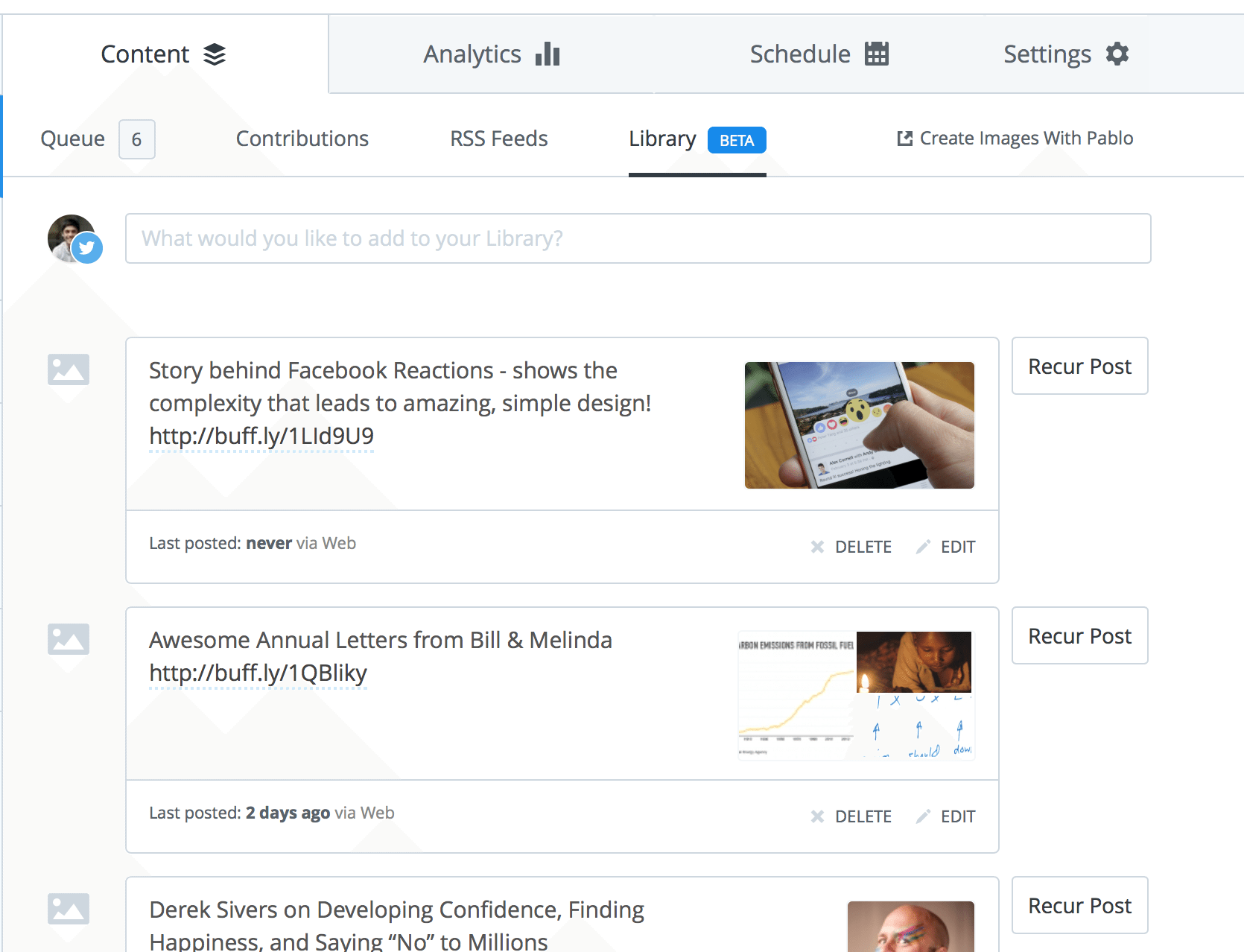
A major hurdle for agencies: Client education
In chatting with Cat and the TBD Media team, it’s apparent that they know their stuff!
The folks whom agencies serve tend to have some really great ideas, too.
It’s this intersection of agency knowledge and client-side tactics that can sometimes lead to some blocks and hurdles.
For instance, if a client hops onto Facebook and notices a new trending topic, they might reach out to the agency to see if something can be whipped together quite quick. Yet who knows how that might fit with the overall strategy the agency has put together.
We spend more time teaching and training clients why and what. Plenty will start running the job for me; I am older, which is kind of funny. I’ve been doing digital marketing for over 10 years, so I’ve seen a lot change. We have younger staff and we do try new, cutting-edge things all the time, but with my handful of clients now, a lot of it is pushed back on with “Well, I saw this” or “I want to try this” or “today is throwback Thursday, here’s a picture.” If it’s not a dedicated strategy, it’s just something they thought, it can be hard to say “Well, that’s not going to work because…”
We try to fight the good fight and balance between what their expectations are and what the right thing to do is. I have this integrity where I want it to be the best product it can be, that it’s meaningful, and it resonates with their customer base.
From an even higher level, there’s a key benefit that agencies like TBD Media bring to the table: They have the bandwidth to consider the full strategy for a brand and know the exact execution it will take to make things happen. They have a wonderful perspective! Sharing that perspective and helping the client to get on board is key to making the biggest impact possible.
It’s really an education process: “Yeah, this is a great idea, but here’s what we need to try when we need to try it.” We aim for a thoughtful process and not just throwing stuff against the wall.
Finding the best tools to do social
How many social media tools do you think it takes to run a fast-growing agency?
How about just one?
Cat and her team use Buffer to schedule all the content for their clients.
Beyond that, they gain the info they need from working natively with Facebook, Twitter, and other social networks. They use the networks themselves for social listening and monitoring.
To be honest, there aren’t really a lot of tools we use besides Buffer. We end up going to the native apps more than anything; we use Drive, Dropbox, and all these other random things, but besides Buffer and our software reporting, we’re not really tool heavy.
Some clients probably only see Buffer through their own eyes, their process, or if they have a new hire who comes on board and someone is using it, they might only know what they’ve been shown. It’s fun for us to say, “What else can we make Buffer do or how can we get it to work for a client?” That, plus the fact that we mix up our verticals on purpose, has made us kind of a thought leader in that sense of “Let’s show this to this client.” Even though most people might say “Okay, it’s just a scheduling tool.” For us it’s more of a conversation starter and a curation and analytics tool.
Want the smoothest social media experience for your team and clients?

TBD Media and hundreds of other agencies use Buffer to manage social media profiles, content, analysis, and more for each and every client. With Buffer, you’ll get straightforward pricing that scales along with your business, 24/7 customer support, and an agency-first approach to the features that matter to you.
Join TBD Media and 5,000+ other brands and business with a free 30-day trial of Buffer’s most powerful social media features!
—
Huge thank you to Cat Killfoil and TBD Media for sharing some agency insights with us. You can download the full text of the interview here. Thanks to Rev for the transcription.
Try Buffer for free
190,000+ creators, small businesses, and marketers use Buffer to grow their audiences every month.

